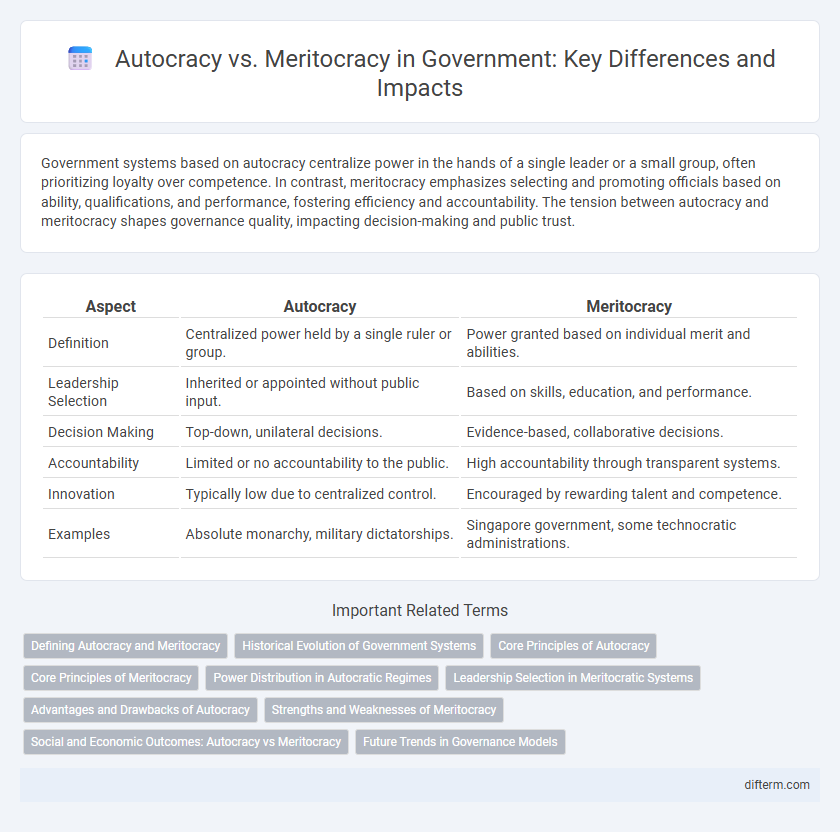Government systems based on autocracy centralize power in the hands of a single leader or a small group, often prioritizing loyalty over competence. In contrast, meritocracy emphasizes selecting and promoting officials based on ability, qualifications, and performance, fostering efficiency and accountability. The tension between autocracy and meritocracy shapes governance quality, impacting decision-making and public trust.
Table of Comparison
| Aspect | Autocracy | Meritocracy |
|---|---|---|
| Definition | Centralized power held by a single ruler or group. | Power granted based on individual merit and abilities. |
| Leadership Selection | Inherited or appointed without public input. | Based on skills, education, and performance. |
| Decision Making | Top-down, unilateral decisions. | Evidence-based, collaborative decisions. |
| Accountability | Limited or no accountability to the public. | High accountability through transparent systems. |
| Innovation | Typically low due to centralized control. | Encouraged by rewarding talent and competence. |
| Examples | Absolute monarchy, military dictatorships. | Singapore government, some technocratic administrations. |
Defining Autocracy and Meritocracy
Autocracy centralizes power in a single ruler or a small group, often limiting political freedoms and public participation, which can lead to unchecked authority. Meritocracy allocates power and opportunities based on individual abilities, achievements, and qualifications, promoting efficiency and competence in governance. Contrasting autocracy with meritocracy highlights the tension between concentrated control and merit-based leadership selection in political systems.
Historical Evolution of Government Systems
Autocracy emerged prominently in ancient civilizations, where absolute rulers like pharaohs and emperors centralized power, often justifying their authority through divine right. Over centuries, meritocracy gained traction as societies recognized the benefits of appointing officials based on ability and achievement rather than lineage or privilege. The historical evolution from autocratic regimes to meritocratic governance illustrates a shift toward more efficient and rational administrative structures in complex governments.
Core Principles of Autocracy
Autocracy is defined by centralized power, where decision-making authority is concentrated in a single ruler or a small group with minimal input from the populace, emphasizing control and obedience. The core principles include absolute authority, limited political pluralism, and restricted individual freedoms to maintain order and stability. This system often relies on top-down governance and the suppression of dissent to enforce uniform policies and command loyalty.
Core Principles of Meritocracy
Meritocracy in government emphasizes selection and advancement based on individual abilities, skills, and achievements, rather than hereditary privilege or autocratic control. Core principles include equal opportunity, transparency in evaluation, and incentive structures that reward talent and performance. This system aims to maximize efficiency and fairness by promoting leaders whose qualifications are demonstrably superior.
Power Distribution in Autocratic Regimes
Power distribution in autocratic regimes is highly centralized, with authority concentrated in the hands of a single leader or a small elite group, limiting checks and balances. Decision-making is top-down, often bypassing institutional or merit-based processes, which can lead to arbitrary use of power and reduced accountability. This centralization contrasts sharply with meritocratic systems where power is distributed based on individual merit and competence.
Leadership Selection in Meritocratic Systems
Meritocratic systems prioritize leadership selection based on demonstrated competence, skills, and achievements rather than inherited status or authoritarian control. This approach ensures that leaders possess the expertise and qualifications necessary to effectively manage government functions and address complex societal challenges. Emphasizing transparent evaluation processes and merit-based promotions fosters accountability and encourages continuous development within public administration.
Advantages and Drawbacks of Autocracy
Autocracy centralizes power in a single leader, enabling swift decision-making and strong control over national policies, which can enhance stability during crises. This concentration of authority often limits political pluralism and suppresses dissent, risking abuse of power and undermining democratic freedoms. While autocracy can drive rapid implementation of policies, it frequently lacks accountability mechanisms, leading to potential inefficiencies and corruption.
Strengths and Weaknesses of Meritocracy
Meritocracy promotes efficiency and innovation by rewarding individuals based on talent and achievement, fostering a skilled and motivated leadership. However, it risks perpetuating inequality by privileging those with access to education and resources, potentially overlooking broader social diversity. The system's emphasis on measurable merit can also undervalue collaboration and ethical considerations essential for holistic governance.
Social and Economic Outcomes: Autocracy vs Meritocracy
Autocratic regimes often experience accelerated decision-making but tend to suffer from economic inefficiencies and social inequalities due to lack of accountability and limited public participation. In contrast, meritocratic governments promote social mobility and economic growth by rewarding competence and fostering innovation through transparent, performance-based systems. Empirical studies highlight that meritocracies generally achieve higher human development indices and more equitable wealth distribution compared to autocratic states.
Future Trends in Governance Models
Autocracy, characterized by centralized power and limited political pluralism, faces increasing challenges as global demands for transparency and accountability grow. Meritocracy, emphasizing competence and performance-based governance, is gaining traction through advancements in data analytics and AI-driven decision-making systems. Future governance models are likely to integrate hybrid approaches, leveraging technological innovation to balance efficiency with inclusive participation.
autocracy vs meritocracy Infographic

 difterm.com
difterm.com